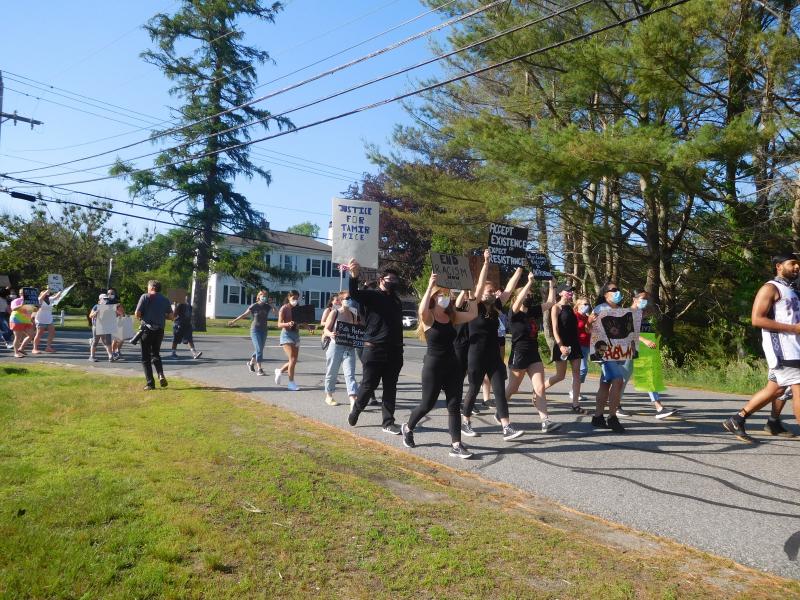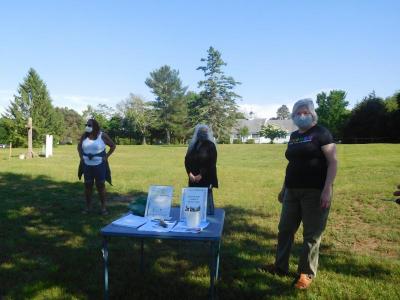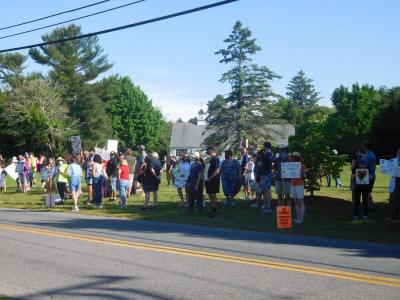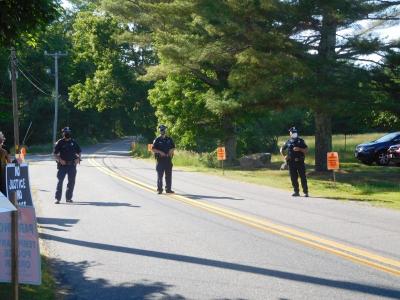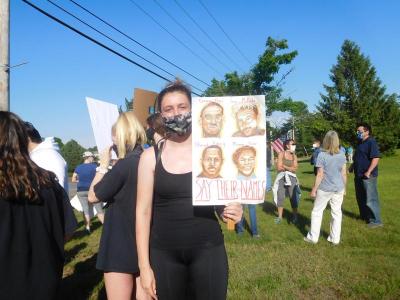Rochester protestors listen to black voices
ROCHESTER — A peaceful march from Plumb Corner to the Police Department offered participants the chance to hear black perspectives, experiences and truths.
After taking about an hour to assemble late in the afternoon of June 12, and showing signs to passing motorists, marchers made their way to the Rochester Police Department, chanting “hands up, don’t shoot!” and “no justice, no peace,” among others.
Most of the protest was listening to black Tri-Town residents and white allies speak.
Jendell Teixeira opened up the remarks by saying that “black women are overlooked. Don’t forget about black women, or the black trans people killed.”
She warned about the dangers of blind patriotism and how many hide racist ways with patriotism.
Although slavery ended long ago, Teixeira said that prisoners can do work without pay, and this has become the new slavery.
She called for activists to abolish the police department, and redistribute the money into the community, adding there was no reason why police departments have more money than schools. Her call to action was met with cheers.
Marion resident Talon Gomes had a wide-ranging speech, and called on white people to educate themselves. He also discouraged them from trying to direct protests too much.
Gomes said black people have “years and years of pent-up frustration,” but added to white supporters that “choreographing our anger isn’t your place.”
He pointed out that “black excellence is great, but I shouldn't have to be a Harvard grad to matter.”
Gomes also brought up double standards for white and black gang members, where the Mafia and Hells Angels are romanticized, but “I can’t be proud of my cousin for being a crip.”
He also made it clear that he has genuine white friends, and you “don’t have to be a bad person to be a racist,” but told protestors that he has often felt pressure to assimilate and fit in, even though he had to grapple with what assimilation means.
Organizer Lexi Sylvia got threats for publicizing the event, including people saying “they are going to bring out guns,” in response to protestors.
She said she witnessed racist behavior at ORR and called the march making up for times she didn’t speak.
“Better late than never,” one crowd member responded.
She also told the story of her black uncle, who was accused of improperly touching a child in a pool while on a business trip and sentenced to 10 years in jail.
Charnelle Perry has lived in Mattapoisett her whole life, and was 6 years old the first time she was called the n-word.
She got emotional while speaking about her son, and said “I am tired of having to yell and scream and be called an angry black woman.”
Perry also asked white allies to “protect my baby. I can’t do it by myself.”
She said he was an honors student, but all guidance counselors suggested was that “maybe he should go to night school.”
Many of the participants brought up problems with the school system.
Tori Monteiro asked “why can’t I sit in a classroom and feel okay?”
In part it was because of racist comments by teachers (one of which called her hair a “mop”), and the fact that she had to find any allies for herself.
She also struggled to communicate to administrators that “not everything I do has to be fixing your broken system.”
Though Teixeira graduated, she said she was “so emotionally drained and so depressed from dealing with all of it.”
Tara Martino ended out the speeches by urging attendees to call out teachers and educational representatives. She said the issue is impacting students at every level, and she sees it in her job as a school nurse.
She also had some choice words for the police who detailed the event, saying that “bad policies turn good officers into silent accomplices,” and if cops aren’t able to understand that black anger is legitimate, “you aren’t willing to protect and serve.”



